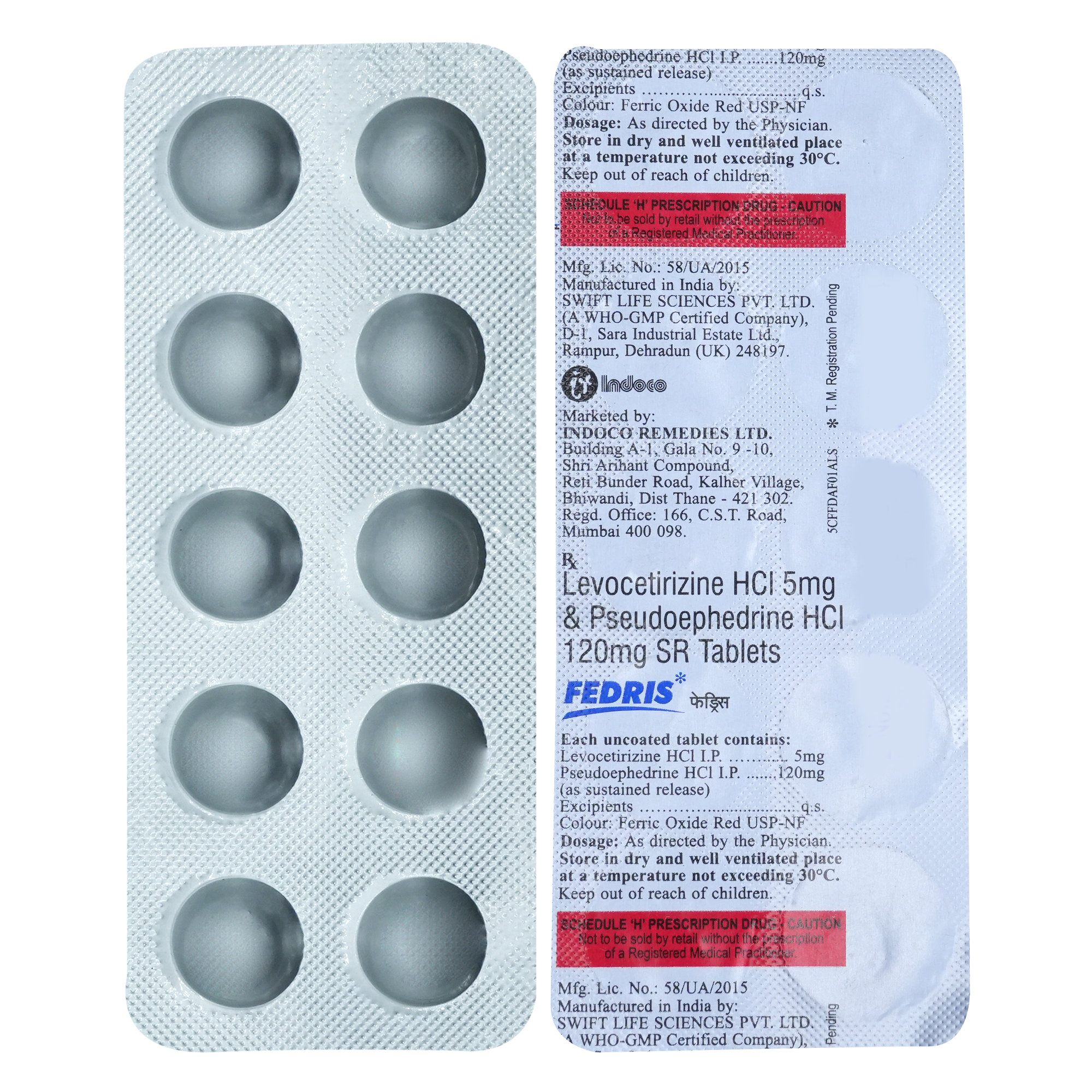Levocetirizine+pseudoephedrine
About Levocetirizine+pseudoephedrine
Levocetirizine+pseudoephedrine is a respiratory medication, primarily used to treat symptoms of the common cold, flu, and allergies such as sneezing, runny nose, nasal and sinus congestion, stuffy nose, or watery eyes. The common cold is a respiratory illness that affects the nose and throat and is caused by viruses known as 'rhinoviruses'. The virus enters the body through the nose, mouth or eyes and spreads quickly through air droplets when a sick person sneezes, coughs or talks.
Levocetirizine+pseudoephedrine consists of two medicines: Levocetirizine (antihistamine) and Pseudoephedrine (decongestant). Levocetirizine belongs to the class of antihistamines or anti-allergic that works by blocking the action of histamine, a substance responsible for causing allergic reactions. It helps to provide relief from allergy symptoms such as sneezing, running nose, watery eyes, itching, swelling, and congestion or stiffness. On the other hand, Pseudoephedrine belongs to the class of decongestant drugs. Works by narrowing small blood vessels in your nose. This helps mucus and airflow more freely in the cavities in your nose (sinuses), helping you to breathe more easily. Altogether Levocetirizine+pseudoephedrine relieves the symptoms from common cold symptoms.
Take Levocetirizine+pseudoephedrine as prescribed. Your doctor will recommend how often you take Levocetirizine+pseudoephedrine based on your medical condition. Do not stop taking Levocetirizine+pseudoephedrine on your own until the doctor advised you to do so. Some people may experience headaches, dry mouth, nausea, vomiting, tiredness, sleepiness, and drowsiness. Most of these side effects of Levocetirizine+pseudoephedrine do not require medical attention and gradually resolve over time. However, if the side effects persist or worsen, please consult your doctor
If you are allergic to Levocetirizine+pseudoephedrine or any other medicines, please tell your doctor. If you are pregnant or breastfeeding, it is advised to inform your doctor before using Levocetirizine+pseudoephedrine. Levocetirizine+pseudoephedrine is not recommended for children below 12 years of age. Do not take Levocetirizine+pseudoephedrine if you suffer from severe kidney disease. Drink plenty of fluids while taking Levocetirizine+pseudoephedrine to loosen mucus. Before taking Levocetirizine+pseudoephedrine, inform your doctor if you have kidney, or severe liver problems, thyroid disorder, blocked arteries, prostate problems, diabetes, glaucoma, or heart disease. Avoid alcohol while taking Levocetirizine+pseudoephedrine, since it can worsen the side effects like dizziness and sleepiness.
Uses of Levocetirizine+pseudoephedrine
Medicinal Benefits
Levocetirizine+pseudoephedrine is a combination of two drugs: Levocetirizine and Pseudoephedrine primarily used to treat symptoms of allergy and the common cold. Levocetirizine belongs to the class of antihistamines (anti-allergic drugs) that works by blocking the action of histamine, a substance responsible for causing allergic reactions. It helps provide relief from allergy symptoms such as sneezing, running nose, watery eyes, itching, swelling, congestion, or stiffness. Pseudoephedrine belongs to the class of decongestant drugs. Works by narrowing small blood vessels in your nose. This helps mucus and airflow more freely in the cavities in your nose (sinuses), helping you to breathe more easily. Altogether Levocetirizine+pseudoephedrine relieves the symptoms from common cold symptoms.
Directions for Use
Storage
Side Effects of Levocetirizine+pseudoephedrine
- Headache
- Dry mouth
- Nausea
- Vomiting
- Restlessness
- Tiredness
- Dizziness
Drug Warnings
If you are allergic to Levocetirizine+pseudoephedrine or any other medicines, please tell your doctor. If you are pregnant or breastfeeding, it is advised to inform your doctor before using Levocetirizine+pseudoephedrine. Levocetirizine+pseudoephedrine is not recommended for children below 12 years of age. Drink plenty of fluids while taking Levocetirizine+pseudoephedrine to loosen mucus. If you have glaucoma, prostate problems, thyroid disorder, blocked arteries or veins, diabetes, heart disease, inform your doctor before taking Levocetirizine+pseudoephedrine. Before taking Levocetirizine+pseudoephedrine, inform your doctor if you are already taking medicines like high blood pressure medications such as guanethidine, and methyldopa; drugs used to control heart rhythms or contractions such as digoxin; Oxytocin (a drug used to help contractions during childbirth). Do not take Levocetirizine+pseudoephedrine if you are already taking, or have taken in the last two weeks, medicines for depression known as Monoamine Oxidase Inhibitors (MAOIs).
Drug Interactions
Drug-Drug Interactions: Levocetirizine+pseudoephedrine may interact with ritonavir (a medicine used to treat HIV), theophylline (treat lung diseases), blood pressure medications such as atenolol, carvedilol, labetalol, metoprolol, nadolol, propranolol; amitriptyline (treat symptoms of depression); doxepin (a medicine used to treat insomnia).
Drug-Food Interactions: Levocetirizine+pseudoephedrine may interact with alcohol. Therefore, avoid alcohol consumption with Levocetirizine+pseudoephedrine as it may increase the risk of adverse effects such as drowsiness, dizziness, or difficulty in concentrating.
Drug-Disease Interactions: If you have high blood pressure or heart disease, diabetes, overactive thyroid gland, glaucoma, severe kidney problems, enlarged prostate, cough with mucus or cough caused by asthma, smoking, inform your doctor before taking Levocetirizine+pseudoephedrine.
Drug-Drug Interactions Checker List:
Safety Advice

Alcohol
unsafeIt is advised to avoid consuming alcohol with Levocetirizine+pseudoephedrine as it could lead to increased drowsiness or dizziness.

Pregnancy
cautionThe safety of Levocetirizine+pseudoephedrine in pregnant women is unknown. Therefore, it is given to pregnant women only if the doctor thinks the benefits outweigh the risks.

Breast Feeding
cautionThe safety of Levocetirizine+pseudoephedrine in breast-feeding women is unknown. Therefore, it is given to breast-feeding women only if the doctor thinks benefits outweigh risks.

Driving
cautionDo not drive or operate machinery if you experience sleepiness, dizziness while using Levocetirizine+pseudoephedrine. This may affect your ability to drive. Seek medical attention if the symptoms persist longer.

Liver
cautionLevocetirizine+pseudoephedrine should be used with caution in patients with severe liver diseases. Let your doctor know if you have any history of liver diseases or hepatic impairment. Your doctor will weigh the benefits and potential risks before prescribing Levocetirizine+pseudoephedrine.

Kidney
cautionLevocetirizine+pseudoephedrine should be used with caution in patients with kidney diseases. Let your doctor know if you have any history of kidney diseases. Your doctor will weigh the benefits and potential risks before prescribing Levocetirizine+pseudoephedrine.

Children
cautionLevocetirizine+pseudoephedrine is not recommended for children less than 12 years of age.
Habit Forming
Diet & Lifestyle Advise
- Avoid dairy products such as milk as they may increase mucus production. Also, avoid processed or refined foods to have relief from cough. Instead replace baked foods, fried foods, white bread, white pasta, French fries, sugary desserts, and chips with green leafy vegetables.
- Drink plenty of fluids to avoid dry throat while you have a cough and loosen mucus.
- Avoid citrus fruits as they may worsen the cough. Eat fruits rich in water content such as pears, watermelon, peaches, and pineapples.
- Know your triggers like allergens, such as pollen, dust, and food items that make your asthma and other respiratory diseases severe.
- Quit smoking and avoid passive smoking. Smoking may reduce the effectiveness of the medicine.
- Drink warm fluids while you take Levocetirizine+pseudoephedrine to help loosen congestion and lubricate the throat.
- Eat a healthy diet and exercise regularly to strengthen your breathing muscles and boost your immune system.
- Learning breathing exercises will help you move more air in and out of your lungs.
- Avoid consumption of alcohol with Levocetirizine+pseudoephedrine as it may cause tiredness, drowsiness, or lack of concentration.
Special Advise
Regular eye checkup in patients with glaucoma.
Patients Concern
Disease/Condition Glossary
Common cold: The common cold is an infection caused by viruses, mainly 'rhinovirus' affecting your nose and throat (upper respiratory tract). Children younger than six years of age are at the most significant risk of colds, but healthy adults can also be affected to have 2-3 colds annually. In most cases, cold symptoms are recovered within a week or ten days. However, symptoms might last longer in people who smoke or are exposed to allergens like dust, pollutants, etc. Symptoms of a common cold might include a stuffy or runny nose, sore throat, cough, congestion, mild body pain or a mild headache, sneezing, low-grade fever, and feeling unwell (malaise).
An allergy is an immune system response to foreign elements typically not harmful to your body. These foreign elements are known as allergens.’ Allergic condition varies from person to person. Some might be allergic to certain foods and seasonal allergies like hay fever. At the same time, others might be allergic to pollen or pet dander. Levocetirizine+pseudoephedrine is a non-drowsy antihistamine which makes it less likely to make you feel sleepy compared to other antihistamines or antiallergics.
FAQs
Yes, Levocetirizine+pseudoephedrine may cause dry mouth as a temporary side effect in some people. It is not necessary for everyone taking Levocetirizine+pseudoephedrine to experience this side effect. However, to avoid such side effects, drink plenty of water, regularly rinse your mouth, practice good oral hygiene and suck on sugarless candy. However, if the condition persists or worsens, please consult a doctor.
Levocetirizine+pseudoephedrine is not recommended for use in patients with prostate enlargement, since Pseudoephedrine may cause or worsen urinary difficulty in patients with prostate enlargement. It is advised to consult your doctor before using Levocetirizine+pseudoephedrine.
No, you are not recommended to stop taking Levocetirizine+pseudoephedrine without consulting your doctor as it may worsen the condition or cause recurring symptoms. Therefore, take Levocetirizine+pseudoephedrine for as long as your doctor has prescribed it, and if you experience any difficulty while taking Levocetirizine+pseudoephedrine, please consult your doctor.
Take the missed dose as soon as possible. However, if it is time for the next dose, skip the missed dose and go back to your regular dosing schedule.
Levocetirizine+pseudoephedrine consists of two medicines: Levocetirizine and Pseudoephedrine. Levocetirizine belongs to the class of antihistamines or anti-allergic that works by blocking the action of histamine, a substance responsible for causing allergic reactions. It helps provide relief from allergy symptoms such as sneezing, running nose, watery eyes, itching, swelling, congestion, or stiffness. On the other hand, Pseudoephedrine belongs to the class of decongestant drugs. Works by narrowing of small blood vessels in your nose. This helps mucus and airflow more freely in the cavities in your nose (sinuses), helping you to breathe more easily. Altogether it relieves the symptoms from common cold symptoms.






